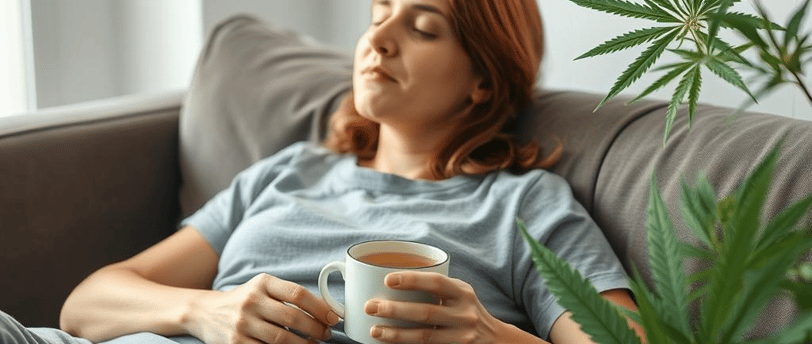Cannabis for Stress & Anxiety: Unlocking Nature’s Best Stress Reliever?
🧘STRESS AND ANXIETY


In today's fast-paced world, stress and anxiety have become increasingly prevalent. Many individuals are seeking natural alternatives to traditional medications for relief. Cannabis, with its diverse range of forms available and potential therapeutic benefits, has emerged as a promising option. However, understanding the complexities of cannabis and its effects on stress and anxiety is crucial before considering it as a treatment.
This article delves into the role of cannabis in managing stress and anxiety, exploring its common symptoms, causes, types, appropriate dosage, potential side effects, necessary precautions, and relevant recipes. We will also examine the underlying scientific evidence and provide credible references to support the information presented.
Understanding Stress and Anxiety: A Primer
Before we explore cannabis, it’s essential to understand what stress and anxiety entail.
Stress: A natural physiological response to challenging or demanding situations. It can manifest in various forms available, from acute (short-term) stress to chronic (long-term) stress. Common symptoms include irritability, difficulty concentrating, muscle tension, and sleep disturbances.
Anxiety: A feeling of worry, nervousness, or unease, typically about an event or something with an uncertain outcome. Anxiety becomes a disorder when it is excessive, persistent, and interferes with daily life. Common symptoms include restlessness, fatigue, difficulty concentrating, irritability, muscle tension, and sleep problems.
Causes of stress and anxiety are multifaceted and can range from genetic predispositions to environmental factors, including workplace stress, relationship problems, financial difficulties, and traumatic events.
Cannabis: A Potential Solution?
Cannabis contains various chemical compounds called cannabinoids, with the two most well-known being tetrahydrocannabinol (THC) and cannabidiol (CBD). These cannabinoids interact with the body's endocannabinoid system (ECS), a complex network that plays a crucial role in regulating mood, pain, appetite, and sleep.
Types of Cannabis and Their Effects:
THC-dominant: These strains are known for their psychoactive effects, producing a "high." While some individuals find that THC can alleviate stress and anxiety, it can also exacerbate these conditions in others, particularly at high dosage. Potential side effects include paranoia, anxiety, and panic attacks.
CBD-dominant: CBD is non-psychoactive and does not produce a "high." It is believed to have anti-anxiety and anti-inflammatory properties. Many users find that CBD helps to reduce stress and anxiety without causing significant cognitive impairment.
Balanced THC/CBD: These strains offer a combination of the potential benefits of both cannabinoids. They may be a good option for individuals who are seeking a more balanced effect.
Scientific Evidence:
The scientific evidence supporting the use of cannabis for stress and anxiety is still evolving.
CBD: Studies have shown that CBD may reduce anxiety in social anxiety disorder (Bergamaschi et al., 2011) and improve sleep quality (Shannon et al., 2019).
THC: While some studies suggest that low doses of THC may reduce anxiety, high doses can have the opposite effect (Blessing et al., 2015).
Forms Available & Dosage:
Cannabis comes in various forms available, each with different onset times and durations of effects:
Smoking/Vaping: Provides rapid relief but can have negative respiratory effects.
Edibles: Have a delayed onset (1-2 hours) but longer-lasting effects.
Tinctures: Absorbed sublingually (under the tongue) for faster effects than edibles.
Topicals: Applied to the skin for localized relief of pain and inflammation.
Capsules: Provide a consistent dosage but have a slower onset.
Dosage is highly individual and depends on factors such as body weight, metabolism, tolerance, and the specific product being used. It is crucial to start with a low dosage and gradually increase it until the desired effect is achieved. Consulting with a healthcare professional or cannabis expert is highly recommended.
Recipes incorporating Cannabis
It is essential to remember that ingesting cannabis in food requires more cautious approach and proper dosage calculation.
CBD Infused Tea Ingredients:
1 cup of water
1 tea bag (Chamomile or Lavender can enhance relaxation)
CBD Oil (dosage as recommended by professional)
Honey or Lemon to taste
Instructions:
Boil water and steep tea bag for recommended time
Remove Tea bag and add CBD oil to the tea
Stir well and add honey or lemon to taste.
Precautions & Side Effects:
While cannabis may offer potential benefits, it is crucial to be aware of the precautions and potential side effects.
Precautions:
Cannabis can interact with certain medications.
It is not recommended for pregnant or breastfeeding women.
It can impair cognitive function and should not be used before driving or operating heavy machinery.
Individuals with a history of mental illness should exercise caution.
Side Effects:
Anxiety, paranoia, and panic attacks (especially with high THC)
Dry mouth and eyes
Increased appetite ("the munchies")
Drowsiness or fatigue
Impaired coordination
Conclusion:
Cannabis may hold promise as a natural option for managing stress and anxiety. However, it is not a one-size-fits-all solution. Individuals considering cannabis should carefully weigh the potential benefits and risks, start with low dosage, consult with a healthcare professional if possible and be aware of all the forms available, and prioritize their safety and well-being. Ongoing research is essential to fully understand the long-term effects of cannabis on mental health.
References:
Bergamaschi, M. M., Queiroz, R. H., Chagas, M. H., de Oliveira, D. C., De Martinis, B. S., Kapczinski, F., ... & Crippa, J. A. (2011). Cannabidiol reduces anxiety induced by simulated public speaking in treatment-naïve social anxiety disorder patients. Neuropsychopharmacology, 36(6), 1219-1226.
Blessing, E. M., Steenkamp, M. M., Manzanares, J., & Marmar, C. R. (2015). Cannabidiol as a potential treatment for anxiety disorders. Neurotherapeutics, 12(4), 825-836.
Shannon, S., Lewis, N., Lee, H., & Hughes, S. (2019). Cannabidiol in anxiety and sleep: A large case series. The Permanente Journal, 23.
Disclaimer: This article is for informational purposes only and does not constitute medical advice. Always consult with a qualified healthcare professional before making any decisions related to your health or treatment.
